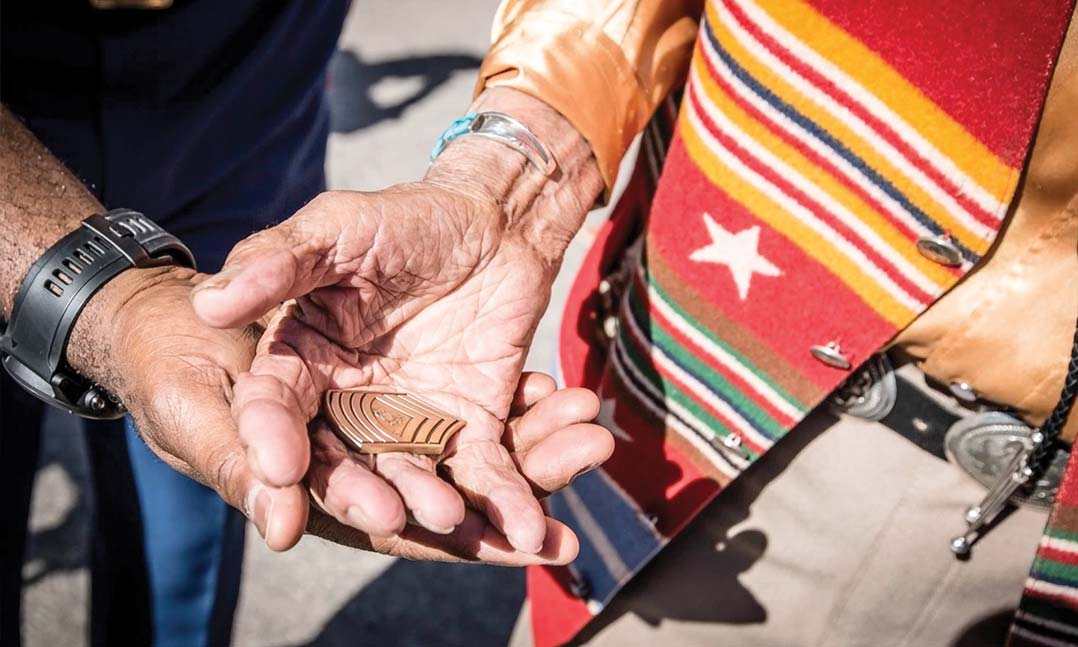During this year’s National Native American Heritage Month, VFW commemorates veterans who have served in the military and recognizes veterans of the past who fought overseas.
Today, a monument dedicated to Native American troops can be visited at the Smithsonian Institute in Washington, D.C. Also, VA is making an effort to bring health care services to rural Native American veterans.
 Then-Sergeant Major of the Marine Corps Ronald Green hands his challenge coin to a Navajo code talker on Aug. 14, 2016, during a National Navajo Code Talkers Day celebration in Window Rock, Arizona. US Marine Corps photo.Native American and Medal of Honor Recipient was a VFW Member
Then-Sergeant Major of the Marine Corps Ronald Green hands his challenge coin to a Navajo code talker on Aug. 14, 2016, during a National Navajo Code Talkers Day celebration in Window Rock, Arizona. US Marine Corps photo.Native American and Medal of Honor Recipient was a VFW Member
A World War II veteran and VFW member earned the Medal of Honor in the Korean War. The late South Dakotan’s VFW Post — located in North Dakota — is named in his honor.
Army veteran Woodrow Keeble, who died on Jan. 28, 1982, was one of the 29 Native American veterans who earned the most prestigious award for valor, as well as one of 14 who earned the award during the period from WWII to the Vietnam War. (See “Native Americans Who Earned the Medal of Honor.”)
Keeble, a World War II and Korean War veteran, was a member of VFW Post 4324 in Wahpeton, North Dakota, located in the southeastern portion of the state.
A South Dakota native, Keeble also was a member of the Sisseton Wahpeton Oyate tribe. His former Post is named Woody Keeble VFW Post 4324.
Keeble earned the Medal of Honor for his actions in the Korean War on Oct. 20, 1951, near Sangsan-ni, located in today’s North Korea. Master Sgt. Keeble “distinguished himself” while acting as his
platoon’s leader, a part of G Co., 19th Inf. Regt., 24th Inf. Div., according to Keeble’s Medal of Honor citation.
Keeble and his platoon attacked “Hill 765,” which was well-defended by enemy forces. In the battle, Keeble joined men of the unit who were pinned down by enemy fire. Keeble then crawled toward enemy gun emplacements and threw grenades at enemy troops. Keeble continued his “one-man assault” to fight enemy forces. This helped troops of his unit to continue the fight, according to Keeble’s Medal of Honor citation.
“Inspired by his courage, Company G successfully moved forward and seized its important objective,” Keeble’s citation stated. “The extraordinary courage, selfless service and devotion to duty displayed that day by Master Sgt. Keeble was an inspiration to all around him and reflected great credit upon himself, his unit and the U.S. Army.”
A total of 29 Native American military service members have been awarded the Medal of Honor, according to the Department of Defense. This includes 25 soldiers, three sailors and a Marine.
Fourteen of those awarded the Medal of Honor earned it during World War II through the Vietnam War. Those are (by date):
- Marine Corps Maj. Gregory Boyington, WWII
- Army 2nd Lt. Ernest Childers, WWII
- Army 1st Lt. Jack Montgomery, WWII
- Army Tech. Sgt. Van Barfoot, WWII
- Army Sgt. Roy Harmon, WWII
- Navy Cmd. Ernest Evans, WWII
- Army Pvt. 1st Class John Reese, WWII
- Army Cpl. Mitchell Red Cloud Jr., Korean War
- Army Capt. Raymond Harvey, Korean War
- Army Sgt. 1st Class Tony Burris, Korean War
- Army Master Sgt. Woodrow Keeble, Korean War
- Army Pvt. 1st Class Charles George, Korean War
- Navy BM1 James Williams, Vietnam War
- Navy GM2 (SEAL) Michael Thornton, Vietnam War
VA Aims to Improve Native American Health Care
Earlier this year, VA announced plans to bring easier VA health care access to Native American veterans living on tribal lands in rural areas of the country.
In March, VA formed the new Advisory Committee on Tribal and Indian Affairs. VA Secretary Dennis McDonough said that the committee’s four goals are to:
- Increase access and improve the quality of services for eligible Native American patients served by VA and the Indian Health Service.
- Facilitate enrollment and navigation for eligible Native American veterans.
- Allow the integration of electronic health records and other systems that affect the health care of Native American vets.
- Improve access for patients through resource sharing, including technology, providers, training, human resources, services, facilities, communication and reimbursement.
- For more information about the new VA committee and other benefits available to Native American Veterans, visit https://www.va.gov/tribalgovernment.
This article is featured in the 2022 November/December issue of VFW magazine, and was written by Dave Spiva, associate editor for VFW magazine.